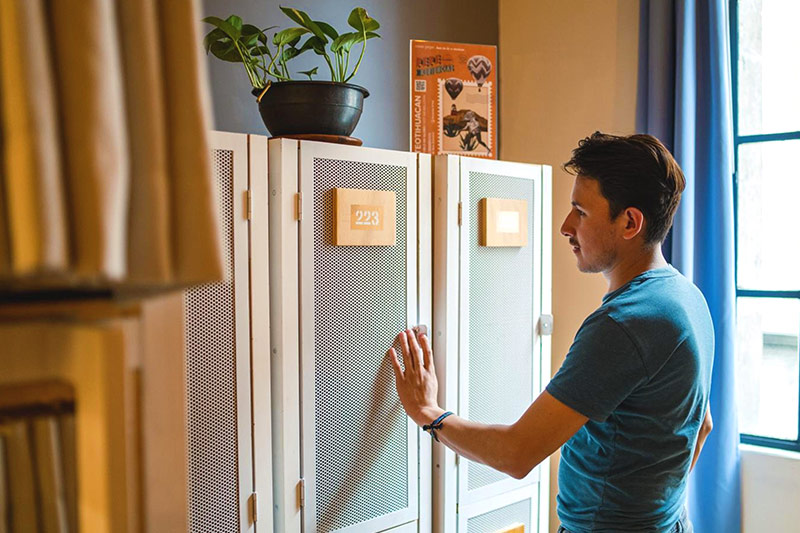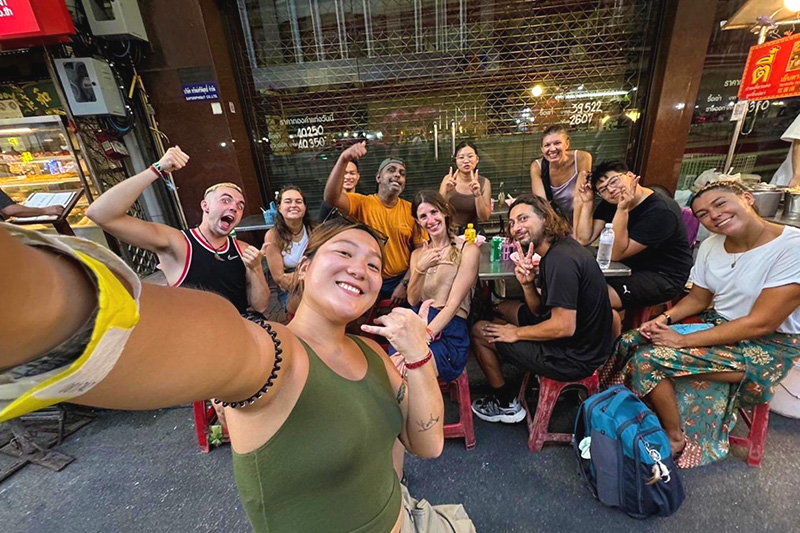Sleeping and staying in hostels can be challenging. Between having to share with people you don't necessarily know, people coming and going at strange hours, and not being in your own home, there are lots of reasons some travelers struggle to get their beauty sleep when they're staying at a hostel in bustling cities like Barcelona or Amsterdam.
But it doesn't have to be that way. There are plenty of ways you can get a solid night's sleep - even if you're sharing a room with fifteen other travelers. Honestly, if you end up in a wonderful place with great people, hostel life is better than real life.
Here are some of our favourite tried-and-true strategies from our Hostelz experience!
Tips for Staying in Hostels
- 1. Be Smart: Choose the right Room Type for you
- 2. Consider your Hostel's Location
- 3. Bring Supplies!
- 4. Don't set your expectations too high
- 5. Pick your bunk wisely
- 6. No bar on the top bunk? Make a barrier
- 7. Is your room truly awful? Let staff know
- 8. Sleep at a reasonable time
- 9. Only go to bed once you're really tired
- 10. Just say NO to the plastic bag rustle
- 11. Keep important stuff within easy access
- 12. Think twice about turning on the lights
- 13. Respect quiet hours
- 14. Put your alarm on vibrate & under your pillow
- 15. Don't abuse the snooze (button)
- 16. Don't hang out in the dorm when other people are sleeping
- 17. No sexy time in the shared rooms!
- Common Questions about Staying in Hostels
These tips are also important if you are considering working in a hostel during your travels.
1. Be Smart: Choose the right Room Type for you
If you know you're an incredibly light sleeper, it might be worth your while to consider paying a bit more to have a private room, or maybe one that only has four beds instead of twelve, especially in popular destinations like Rome or Prague. It could be a small investment that ends up being one of the best decisions of your trip.
This is where timing comes in regard to booking. Hostels tend to have less private rooms than shared, so booking last minute could mean you miss out.
We have collected the world's coolest hostels with private rooms here.
How about a few examples?
- Best Hostels in Prague with Private Rooms
- Best Hostels in Rome with Private Rooms
- Best Hostels in Amsterdam with Private Rooms
Here is a guide on when to book hostels – for spontaneous souls and pre-planners.
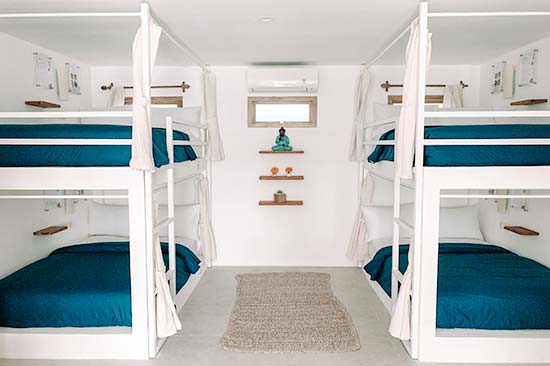
2. Consider your Hostel's Location
Before you book a hostel, read their reviews on Hostelz and the major hostel booking sites. This is especially important for popular backpacking destinations like Thailand or Australia.
Read: How to compare hostels with Hostelz.com
There's a ton of information on them, including lots about the location. If you keep seeing that the hostel is near lots of bars, you'll know it's pretty likely to have some sort of noise at night. This is particularly true in party hotspots like Barcelona or Berlin. Similarly, you could end up miles away from the main landmarks and public transport.
So, choose wisely! This is especially important in sprawling cities like London or New York City.

3. Bring Supplies!
That means an eye mask and earplugs, in this case. They're two small things you can stick in your backpack or suitcase at the last minute, and they can really help you sleep a lot better.
You could also try bringing noise-canceling headphones if noise really bothers you when you're trying to sleep – especially the sound of a snoring neighbor!
Here is our detailed guide to how to pack for a hostel.
We recommend bringing your own little travel, even when the hostel provides towels. It's just handy to have your own, small towel.

4. Don't set your expectations too high
Sleeping in a shared room whilst staying in hostels isn't always easy.
Even the quietest, nicest roommates will need to come and go at different times. And while you can get very, very comfy hostel beds, the average hostel bunk isn't going to compare to one at a fancy hotel.
Some travelers do expect hotel-level amenities when they're staying in a hostel. But hostels are generally about basics rather than luxury. Your expectations may end up being surpassed, of course, but don't go in expecting to be pampered.
Read: How to filter for good Hostels
If you already go in with the mindset that things are going to be a bit different, you'll be ahead of the game.
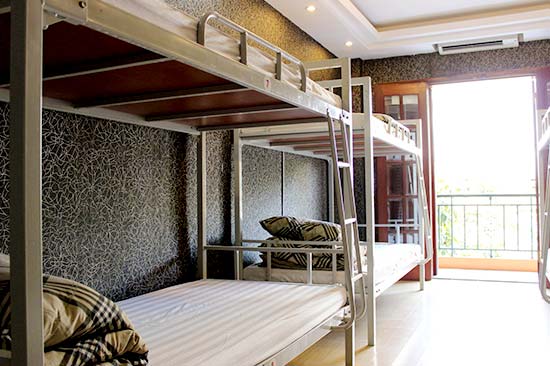
5. Pick your bunk wisely
Maybe you'll be able to sleep better on the top bunk, as nobody will be clambering up a ladder by your face to get into their bed. You might feel a bit more privacy up there, too, and it's less likely that people will use top bunks for communal purposes.
Or maybe you'd rather have the bottom bunk, which might have a better chance of being next to outlets to plug your electronics into. You also won't have to deal with trying to climb up into bed in the middle of the night, and you'll be within easier reach of your stuff.
There's no right or wrong answer here – it's all about what you prefer!
Fun: Why Solo Travelers are Superheroes
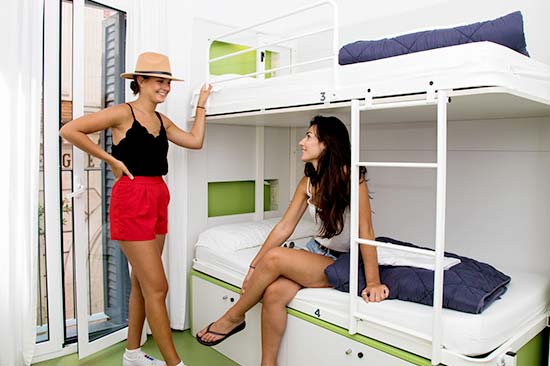
6. No bar on the top bunk? Make a barrier
Most bunk beds have a bar to stop you rolling out in the middle of the night, but every once in a while you'll come across one that doesn't. Roll up a towel or push together some pillows to create a barrier to stop yourself from accidentally falling out of bed.
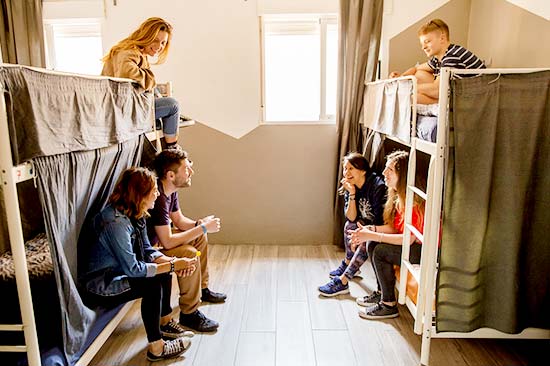
7. Is your room truly awful? Let staff know!
Whether “truly awful” means your bunk is on the verge of collapsing, there are bugs in the sheets, or your roommates are legitimately making you uncomfortable, it's OK to ask the staff if they can do something about it. You can also ask if there are other rooms available if you get to the hostel and realize you probably should have booked a smaller room.
Keep in mind that the staff might not be able to do much, though!
Hopefully they are following our guide on how to create an irresistible hostel.
One thing not to do – don't switch beds without asking first, particularly if there are assigned bed numbers. It can seem easy just to move over to the next bed, but it can be a bit of a pain for hostel staff to deal with on a paperwork level.
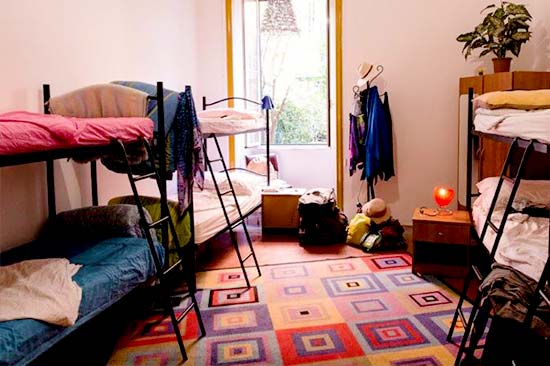
8. Sleep at a reasonable time
If you're planning on going to sleep at 8 p.m., you might be in for an unwelcome wake-up. Or rather, a lot of unwelcome disturbances.
Depending on which country you're in, 8 p.m. might be right when people are getting in from dinner – or it could be right when people are starting to get ready to go out for their evening meal. For example, in Spain, dinner time tends to be much later than in Germany. Either way, your snoozing will probably be interrupted by people coming in and out of the room.
When staying in hostels, plan your sleep schedule according to the norms of the country you're visiting. This is especially important if you are planning to eat out in restaurants for dinner and lunch in countries like Italy or France, known for their culinary culture. For budget-friendly meal ideas, check out our 9 Top Tips for Cooking in Hostels.
Going to bed before sunset may be a bit too much...
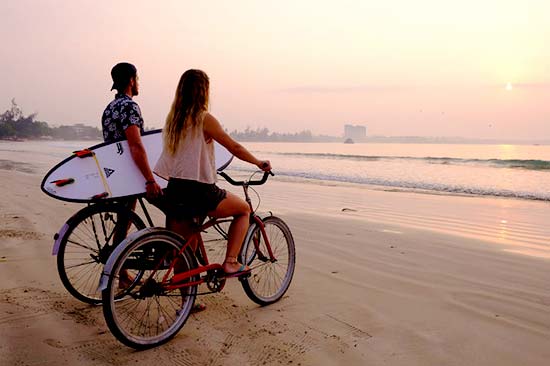
9. Only go to bed once you're exhausted
One way to almost guarantee you fall asleep quickly is by avoiding getting into bed until you're really ready to crash.
Try not to attempt to fall asleep if you're only sort of tired. Relax in the common areas or have a low-key stroll, and only go to your bed when you're 100% ready for some sleep.
And now, because we're all about being conscientious travelers, we're also going to include some tips on how you can be a nice guest and avoid waking your roommates up in the middle of the night! This is particularly important in cities known for their nightlife, like Bangkok or Budapest.

10. Just say NO to the plastic bag rustle
Have you ever heard somebody rustling around for their belongings in plastic bags for ages? If you can, pack your stuff in bags that aren't quite as loud.
11. Keep important stuff within easy access
Maybe put a small bag of must-haves on top of your main suitcase, or keep them in an easily reachable side compartment. This will help you get your stuff faster – and minimize the time you spend making noise that might wake someone else up.
12. Think twice about turning on the lights
Guests in hostels do need to get in and out of the rooms at different times. But if you can, use your phone as a flashlight instead of turning all the lights on in the middle of the night.
Just don't shine it directly into people's faces; this is not how you make friends in hostels!
13. Respect quiet hours
Not all hostels have quiet hours, but if they do, be respectful of other guests by being aware of your noise level. This is especially crucial in densely populated cities like Tokyo or Hong Kong, where space is at a premium.
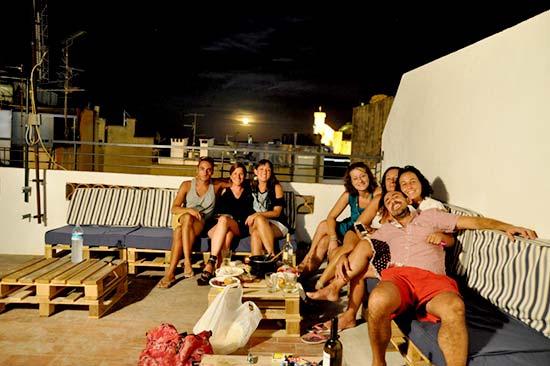
14. Put your alarm on vibrate & under your pillow
Some people in this world enjoy being woken up by an alarm.
There are fewer people that enjoy being woken up by an alarm that isn't theirs!
15. Don't abuse the snooze (button)
There are few easier ways to annoy your roommates than by letting your alarm go off repeatedly. Getting up can be tough, but remember that you're sharing space here. This is particularly true in popular backpacking destinations like Thailand or Vietnam, where many travelers are on different schedules.
16. Don't hang out in the dorm when other people are sleeping
It's fun to chat with your friends while you're getting ready in the morning, but unless you guys have the dorm to yourselves, go somewhere else to do it. This is especially important in cities known for their early-rising culture, like Stockholm or Zurich.
And it is more fun to hang outside anyway…pool anyone? This is particularly appealing in sunny destinations like Barcelona or Sydney.

17. No sexy time in the shared rooms!
On the note of things, you should go somewhere else to do…
Speaking of all things sleeping-related, are you going to need to take your own sheets? What about a pillow? Check out our handy hostel packing guide to get an idea of what you do and don't need to take.
Common Questions about Staying in Hostels
Is it safe to stay in hostels?
Generally speaking, yes, hostels are safe. Please always pay close attention to hostel reviews before booking. Check their safety score and location. This is especially important in large cities like London or Istanbul. A locker is always useful to use to keep your stuff safe.
Can you leave your stuff in a hostel?
Yes. Most hostels offer lockers, or you can leave your valuables at the reception. We recommend checking locker availability before booking. For more information, read Do Hostels Have Lockers?
Why are hostels so cheap?
Hostels are cheaper than hotels as dorms are shared. A hostel can fit 6 people in one room, while hotels only offer private rooms. Hostels need to sell more beds and need more customers than hotels in order to make money. To learn more about the differences, check out our article on Hostel Vs. Hotel: The Difference.
How long can I stay at a hostel?
This really depends on the destination like city and country as well as the hostel policy. Some hostels only allow a maximum stay of 14 days. Others do not have any limit. For example, in popular tourist destinations like Rome or Amsterdam, you might find stricter policies during peak season. For more information on hostel stays, read When to Book Hostels? For Spontaneous Souls & Pre-Planners.
What to wear to sleep in hostel?
It is recommended to wear a pijama or anything alike when sleeping in hostels. As you are sharing a dorm in a hostel, it is appropriate to wear clothing. For more tips on hostel etiquette, check out our guide on Hostel Etiquette: Do's and Dont's.

First-Time in a Hostel? 17 Basic & Advanced Tips to have a great Time
Sleeping and staying in hostels can be challenging. Between having to share with people you don't necessarily know,
Read moreHostelz.com is the world's most comprehensive hostel-focused travel platform. We bring together listings from all the major booking sites to help you easily compare prices, see real guest reviews, and find the best deals—no matter where you're headed. Check out our How It Works page.
Not sure which hostel to pick? Use our Hostel Comparizon Tool to compare your favorite hostels side-by-side before you book.
Let us help you travel smarter and sleep cheaper.
You are Overpaying for Hostels - that Stops now!
Platforms like Hostelworld and Booking.com often have different prices for the SAME room. Even availability can vary depending on the site. 😱
That's where Hostelz steps in. We are the ultimate price comparison tool for hostels. Save up to 23% on your next booking.
Tours & Activities for Solo Travelers
Join group tours, find hidden gems, and meet fellow travelers! GetYourGuide offers thousands of experiences perfect for backpackers and solo adventurers.
Easy Visa Applications Worldwide
Need travel documents fast? iVisa handles the paperwork so you can focus on planning your adventures, not stressing over entry requirements.
Easily Compare Travel Insurance
Starting from $42/month
Starting from $50/month
Affordable and customizable
Volunteer at Hostels Around the World
Exchange your skills for free accommodation and dive into local cultures with Worldpackers. How to find Volunteering Jobs and Travel the World? Our step-by-step guide.





